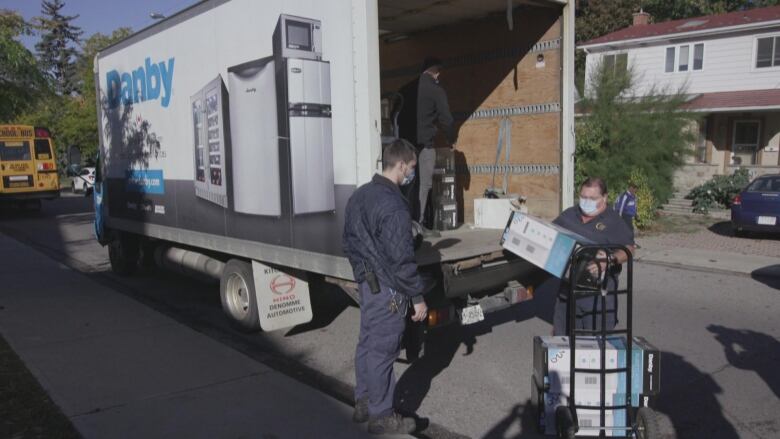TDSB to install 500 portable air filters in high-risk classrooms after corporate donation
Schools should not have to rely on donations to keep classrooms safe, critics say

The Toronto District School Board (TDSB) will install 500 new air purifiers at schools deemed to be at an elevated risk of COVID-19 after a donation by Canadian appliance manufacturer Danby.
The board will distribute the tower-style air purifiers to 37 schools that do not have mechanical ventilation or HVAC systems to otherwise filter or circulate air.
"We want to put as many air purifiers in our schools as possible, but those are expensive, so this is a very substantial donation," said TDSB spokesperson Shari Schwartz-Maltz.
Experts have identified improvements to ventilation systems as an important requirement for the safe reopening of schools, since researchers believe the risk of contracting COVID-19 is greater in indoor spaces with poor ventilation.
However, the TDSB estimates that approximately half of its schools do not have any form of mechanical ventilation, which means classrooms have generally had to rely on open windows for air circulation.
Experts say standalone filters can be an effective tool to improve safety in those classrooms, though they cannot replace actual, building-wide ventilation systems. They also do not negate the need for physical distancing, since the filters are unlikely to prevent the novel coronavirus from spreading during close contact between people.
"I think it's very much similar to masks in that something is better than nothing," said Keith Warriner, a microbiologist at the University of Guelph, of the new air filters.

The model being donated to the board uses a high-efficiency particulate air (HEPA) filter, which has been shown to capture the virus that causes COVID-19.
The virus measures 125 nanometres. A properly functioning HEPA filter can capture particles as small as 10 nanometres.
The filters — which are listed by retailers at around $150 — are designed for rooms up to 188 square feet. Danby says they will be able to circulate and filter the air in a classroom up to six times per hour. A room without an air filter exchanges its air approximately once every two hours due to leakage, the company said.
Warriner noted that hospital-grade filtration systems exchange air approximately 12 times per hour.
The devices also feature ultraviolet-C lights, which have been shown to reduce the spread of other infectious diseases such as tuberculosis, though the effect of ultraviolet radiation on the novel coronavirus is not yet fully understood.
'It should be the goverment's responsibility'
The provincial government in August pledged $50 million to help schools upgrade their aging ventilation systems before the return of students to classrooms, but advocates say the money is not nearly enough to bring Ontario's school infrastructure up to adequate standards.
"That is not very much money, nor did they leave school boards very much time to make any sort of rectifications to the buildings that would optimize ventilation," said Krista Wylie, who co-founded the parent-led campaign Fix Our Schools in 2014.
The TDSB says its share of the ventilation-centred funding amounts to around $6 million, which it received before the start of the school year.
The money will go towards upgrades at schools with mechanical ventilation systems, at which the TDSB also plans to install new air filters six times per year instead of four.

The TDSB is also appealing to other corporate donors for additional HEPA filters. Critics of the school reopening plan say the TDSB's reliance on donations indicates a lack of funding and support by the provincial government.
"To me, that says every classroom across the province should have an air purifier in it as we head into cold and flu season," said Wylie.
Shwartz-Maltz, the TDSB spokesperson, said the board will also consider buying additional standalone HEPA filters for the hundreds of remaining schools that do not have mechanical ventilation with the $6 million in provincial funding, though it's not yet clear how many devices the board intends to buy.
"It's good to see companies stepping up," added Warriner. "But it should be the government's responsibility."